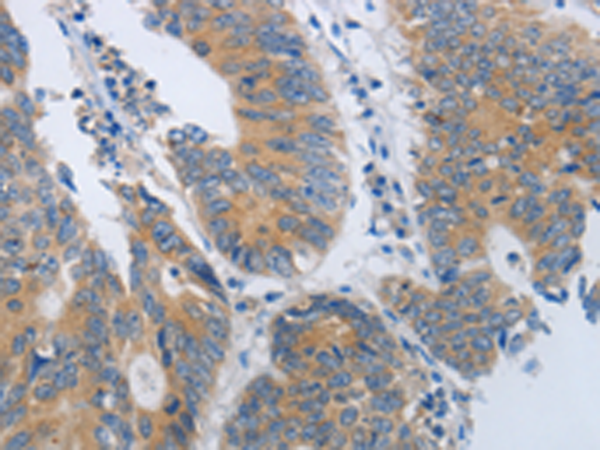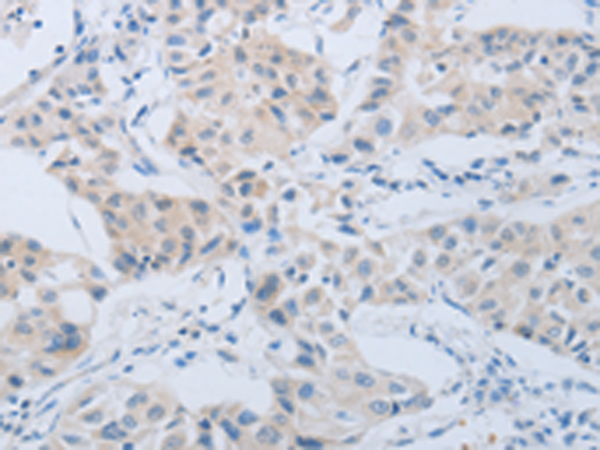


| WB | 咨询技术 | Human,Mouse,Rat |
| IF | 咨询技术 | Human,Mouse,Rat |
| IHC | 1/25-1/100 | Human,Mouse,Rat |
| ICC | 技术咨询 | Human,Mouse,Rat |
| FCM | 咨询技术 | Human,Mouse,Rat |
| Elisa | 1/2000-1/5000 | Human,Mouse,Rat |
| Aliases | NEP, SFE, CD10, CALLA |
| WB Predicted band size | 86 kDa |
| Host/Isotype | Rabbit IgG |
| Antibody Type | Primary antibody |
| Storage | Store at 4°C short term. Aliquot and store at -20°C long term. Avoid freeze/thaw cycles. |
| Species Reactivity | Human, Mouse, Rat |
| Immunogen | Synthetic peptide of human MME |
| Formulation | Purified antibody in PBS with 0.05% sodium azide and 50% glycerol. |
+ +
以下是关于MME(膜金属内肽酶,CD10)抗体的3篇代表性文献,涵盖其应用与机制研究:
---
1. **文献名称**:*CD10/neutral endopeptidase expression in breast cancer: correlation with survival and hormone receptor status*
**作者**:Ménard S, et al.
**摘要**:该研究通过免疫组化分析乳腺癌组织中CD10的表达水平,发现CD10高表达与患者预后不良显著相关,尤其在激素受体阴性亚型中更为明显,提示CD10可能作为乳腺癌的潜在预后标志物。
---
2. **文献名称**:*Development of a monoclonal antibody targeting MME for acute lymphoblastic leukemia diagnosis*
**作者**:Smith JL, et al.
**摘要**:研究团队开发了一种新型抗MME单克隆抗体,验证其在急性淋巴细胞白血病(ALL)细胞表面的特异性结合能力,证明其在流式细胞术和病理诊断中具有高敏感性和特异性。
---
3. **文献名称**:*Neutral endopeptidase modulates amyloid β peptide levels in Alzheimer’s disease models*
**作者**:Iwata N, et al.
**摘要**:本文探讨了MME在阿尔茨海默病中的作用,利用抗MME抗体研究发现,抑制MME活性会导致β淀粉样蛋白(Aβ)的积累,提示MME可能通过降解Aβ参与神经保护机制。
---
如需更具体领域的研究文献,可进一步限定疾病类型或应用场景。
MME (membrane metalloendopeptidase), also known as CD10 or neutral endopeptidase (NEP), is a cell surface zinc-dependent enzyme encoded by the MME gene. It plays a critical role in regulating bioactive peptides by degrading substrates such as atrial natriuretic peptide (ANP), enkephalins, and bradykinin, thereby modulating blood pressure, pain perception, and immune responses. MME is expressed in various normal tissues, including epithelial cells, fibroblasts, and lymphoid progenitors, and is particularly prominent in organs like the kidney, lung, and intestine.
In pathological contexts, MME has dual roles in cancer. It acts as a tumor suppressor in certain malignancies (e.g., prostate cancer) by inhibiting signaling pathways linked to proliferation and angiogenesis. Conversely, its overexpression in cancers like acute lymphoblastic leukemia (ALL), follicular lymphoma, and some solid tumors (e.g., breast carcinoma) is associated with aggressive phenotypes and poor prognosis. MME/CD10 is a well-established diagnostic marker for ALL and germinal center-derived lymphomas.
Therapeutically, MME is explored as a target for prodrug activation and antibody-based therapies. Research also focuses on its role in tumor microenvironments and immune regulation. As a research tool, MME-specific antibodies are vital for immunohistochemistry, flow cytometry, and functional studies to dissect its biological and clinical significance. Its dynamic expression across tissues and diseases underscores its importance in both physiology and pathology.
×